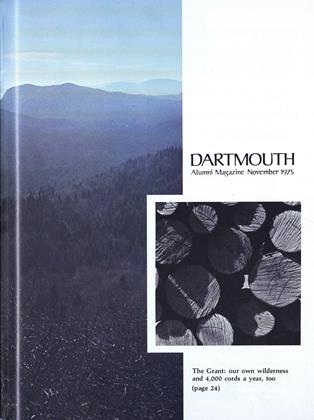Over the years a great many people have wondered what one could - or should - do about William Loeb and his strident newspaper, the Manchester Union Leader. Various newspaper and periodical pieces have treated the subject, including a good one this past year in the New Times.
Here, Professor Veblen is attempting in book form to discover what impact, if any, the Loeb press has on the New Hampshire political scene. To do so, he has examined senatorial and gubernatorial primary and general election races from 1960 to 1972 against the background of heated Loeb editorial drumfire. He has, in addition, interviewed many politicians and political managers involved in these campaigns.
The major points this book arrives at are these: whatever political influence the Loeb press may have, it seems to work at its most effective in primary campaigns (and, given New Hampshire's political orientation, in Republican primary campaigns); and that the influence is not one that can be counted off quantitatively in blocs of vote, but rather it is an influence of aura, of state of mind, of the quality of political life.
In this respect, Veblen shows that some candidates have tailored their campaigns with Loeb and his newspaper in mind. They have done so either negatively by trying to mute their stands on some issues (or trying to ignore these issues completely); or positively, by deliberately taking stands they knew would be antithetical to the holier-than-thou, medieval Loeb postures.
Neither of these strategies has worked very well in New Hampshire for, as any student of politics knows (and Veblen points out), trying to please or antagonize a newspaper is poor politics, for the paper inevitably has the last word. Politicians are far better off addressing themselves to the issues and to the electorate.
In the more measurable matter of elections and their outcomes, Veblen finds that the Loeb press has had relatively little success with its editorial backing of specific candidates. This is not particularly surprising - most Loebwatchers have long ago come to that conclusion _ but, in defense of Veblen, it ought to be pointed out that newspapers in general have very little effect on the outcomes of political races, when the newspaper influence is measured merely in editorial stands for or against candidates.
If there is one quibble to be laid against Veblen's otherwise excellent book, it is that the next-to-final chapter, "Effect on the Electorate." is rather overfull of the scientific mummery in which social scientists delight. For a second and even slighter complaint, the final chapter, "Conclusions," rather dribbled off before all the conclusions were in.
But, in short, Veblen has shown that Loeb is no king-maker, but rather a chaos-maker. He has shown it well, too.
THE MANCHESTER UNIONLEADER IN NEW HAMPSHIREELECTIONS. B. Eric Veblen '64.University Press of New England,1975. 205 pp. $9.
Mr. Farley, assistant director of the DartmouthNews Service, is also a newspaper columnistand a one-time candidate for the NewHampshire senate.
 View Full Issue
View Full Issue
More From This Issue
-
 Feature
FeatureA Delicate Balance
November 1975 By DAN NELSON -
 Feature
FeatureOBESITY
November 1975 By MARy BISHOP ROSS -
 Feature
FeatureFairly Faced
November 1975 By WILLIAM W. COOK -
 Feature
FeatureSome Faults, Some Solid Achievements
November 1975 By M.B.R. -
 Class Notes
Class Notes1923
November 1975 By WALTER C. DODGE, THEODORE R. MINER -
 Class Notes
Class Notes1942
November 1975 By RICHARD W. LIPPMAN, A. JAMES O'MARA
JAMES L. FARLEY '42
-
 Article
ArticleADVOCATE OF PLENTY
November 1946 By JAMES L. FARLEY '42 -
 Feature
FeatureA Shapely Punctuation Mark
July 1974 By JAMES L. FARLEY '42 -
 Feature
FeatureA MEMORANDUM
January 1975 By JAMES L. FARLEY '42 -
 Feature
FeatureCommencement
June 1975 By JAMES L. FARLEY '42 -
 Feature
FeatureA MEMORANDUM
December 1976 By JAMES L. FARLEY '42 -
 Article
ArticleCommencement
June 1981 By James L. Farley '42
Books
-
 Books
BooksAlumni Articles
OCTOBER 1967 -
 Books
BooksTHE LANGUAGE BOOK.
APRIL 1964 By ANITA NORMAN -
 Books
BooksTHE PSYCHOLOGY OF RADIO
January 1936 By C. N. Allen '24 -
 Books
BooksFRENCH COMME 1L FA UT.
February 1935 By Charles R. Bagley -
 Books
BooksSELECTED WRITINGS OF OSCAR WILDE.
JUNE 1969 By JOHN HURD '21 -
 Books
BooksPROCEEDINGS OF THE THIRD NEW HAMPSHIRE BANK MANAGEMENT CONFERENCE
October 1942 By William A. Carter '20


